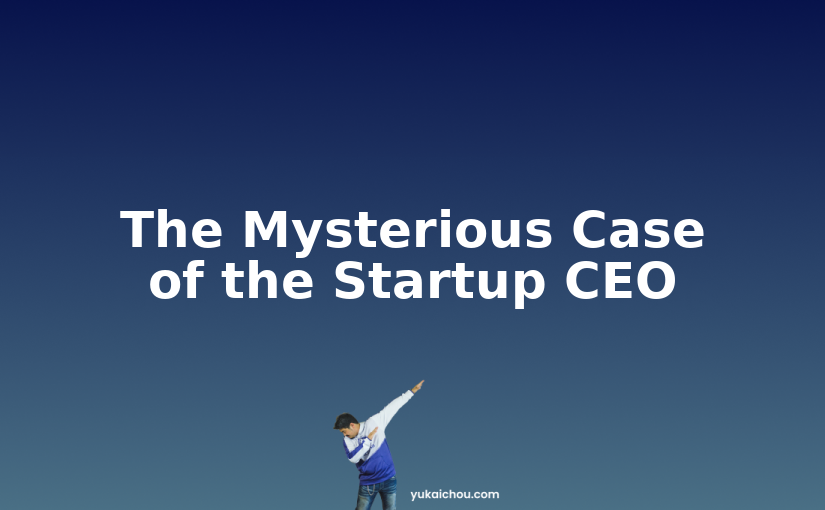What the **** is our CEO doing???
In the past 6 years of being an entrepreneur, I’ve had many small, private conversations with Startup CEOs, and I noticed a pretty interesting but common trend. I initially thought this was more of a unique experience of my own and very few people had the same issue, but I started to see the same thing among technical and non-technical CEOs alike. I then realize it’s something that may be worth sharing about.
Often times, when I ask these startup CEOs about their roles in the company, they would sheepishly say, “Yea…so I’m the ‘CEO’ of the company….whatever that really means…” I’ve been in that mentality myself. It’s hard to explain what you do as a startup CEO, as everything seems pretty vague and does not sound like it tangibly makes the business more value. The only clear task that people actually credit their CEOs is “fundraising”.
But these CEOs unanimously say they work crazy hours. So what are they doing anyway with these hours? It’s somewhat of a mystery.
The To-Do Waterfall
Many CEOs that I talk to have the same pain and complaint. A big part of emailing and meetings actually take up a lot of time, and it becomes hard to execute quickly on other tasks. When you start a company, there’s actually a lot more little coordination stuff internally and externally than most people expect. Many of them say that email answering sometimes occupy their entire day, leaving only off-hours to do anything else. I’ve had the experience myself where every time I’m on the plane for a few hours, 50-60 more emails that I all need to address pop up. The rest of the day becomes catch-up and hopefully beating the new incoming emails.
Even when I try to solve this problem by being briefer and respond to lower priority emails later, it sometimes results in people feeling that I don’t respect their feelings and I have to spend more time mending the relationship. And prioritizing email answering doesn’t help a lot, because eventually, you still need to take action on all of them, and they build up. Often times, I would set out the day wanting to accomplish 10 tasks, and then at the end of the day, I have 13 of those tasks remaining…
The Night in Shining Armor
During off-hours (late at night) where emails stop coming in, that’s when a CEO can catch up with work. But even in those times, a lot of that effort is put into unexpected tasks like putting out fires, as well as being the emotional stronghold to all the teammates. As the CEO, you are the person that everyone goes to when they have complaints about each other, when they feel unsure about the business, or when they have this brilliant idea that you have to acknowledge before they take it too far. And trust me, these things come up A LOT in startup.
The Scarecrow that the Startup deserves, not the one it needs
And this is where the pain lies. After entire days of coordination and communications, the teammates ask, “So what is our CEO doing all day anyway? Is he even doing any work?” Many Startup CEOs feel like they work super hard and add a lot of value to the business, but they’re not appreciated much for their work.
I’ve felt that frustration myself too. Someone would say, “Well earlier I talked to Yu-kai about this pretty essential thing, but I have no clue what he’s been doing besides that.” What’s not as obvious, is that if every member of the company had that “essential” hour conversation with the CEO, the day is pretty much over, not to mention the interaction with lawyers, accountants, and external meetings. And then there’s all the stuff that needs to be filed to the government for having the right license, giving out stock, doing taxes.
Uberman Everyman to the Rescue!
Interestingly, I adapted a Polyphasic Sleep Schedule where I would sleep 3 hours at night and take three 20-minute naps during the day. That worked out great for me, because during the day, I can do all the coordination work. And then between 11PM-5AM, I could focus on getting stuff done.
This lasted for about 3 months, and I actually was able to get most of my stuff done, while having some time to rest and decompress on a game or movie, without falling behind on my tasks. But then ridiculously, I had so many meetings that needed to be booked, I could no longer take the naps during the day (even if I could sleep on the car). It’s only the end of October, and my meetings are already being booked in late November and early December. As a result, I went off my sleep schedule for a few weeks now.
I then was shocked upon the realization of how essential it was: with 6-7 hours of sleep, I became overwhelmingly stressed with all the things that need to be done (of course, that is related to our company being in the “growth” phase). I think I will be adjusting back to the polyphasic sleep schedule soon again.
The Zookeeper’s hardest job is not to find food for the animals but to prevent them from eating each other
The funny thing is, I’m usually appreciated for the stuff that I feel I have the least credit for – fundraising. Fundraising actually does not take nearly as much effort from my part as a lot of other things I do. I feel like my most difficult work is to keep the team aligned and working smoothly together towards a common direction – the work of leadership. It takes a tremendous amount of work to be a good leader (which I am still very far away from). A good leader must recruit the smartest people she can find, people much smarter than herself. However, these people know they are smart and all have the most impressive egos too. None of them are used to someone disagreeing with them in their lives and still being correct. It’s the CEO’s job to make sure they not only work well with her but with EACH OTHER. A tremendous amount of startups fail because they can’t align big egos together.
You build it. I show it. Everyone likes me.
On the other hand, when I successfully raised money, it’s mostly my teammates’ own credit. They have built a great product, got beta customers to sign up whom like it, and everything looks good. When that’s the case, fundraising becomes a lot easier for me, and that’s mostly their work. Before, the team may have ADD and constantly change directions. That makes it really hard to get enough traction and track record to raise money. But after the hard part of aligning everyone in the correct direction and staying discipline to it (this Is the hard part), fundraising becomes a lot more straightforward (which is the easier part).
It takes sloth to know sloth
So why is this case unique to the Startup CEO and not the big corporate CEO? The key difference is, the big corporate CEO works with people who are managing a bunch of others too, and so they see it as normal that “management and coordination” takes up a lot of time. In startups, everyone is executing like crazy – the product is being built, potential customers are being reached, materials are being made, and current customers are being supported. In an environment of such hustle, it appears that the CEO is the one that isn’t doing much.
Startup CEOs need more hugs
My team has worked with me for long enough (4 years), that we all trust and respect each others’ work, and I feel like I no longer need to prove that I’m actually working anymore (raising some funding helps :D). However, I now know that there are a lot of other startups that are facing the same challenges. People keep saying that being a Startup CEO is very lonely. It’s true. But if you happen to be the infamous Startup CEO, know that you are not alone. Others are just as lazy :P.
On the other hand, if you are one of the people who isn’t sure if your CEO is doing anything, cut him some slack by seeing how much work he puts in to make sure the company is functioning normally, and recognize funding is the result of team effort, not merely the CEO’s ability.
Startups need more hugs
At the end of the day, startups should have a stronger culture of appreciation. It’s easy to criticize each other’s imperfections, but it only makes things unproductive and unmotivating. If everyone is more appreciative of everyone else (not just to the CEO), then the Startup CEO actually will have a lot less work to do and more time to get stuff done.
Btw, here’s a list of things good Startup CEOs actually do.











6 responses to “The Mysterious Case of the Startup CEO”
Thanks Will, I remember you very well. Miss the good old days.
Thanks for the support and stay awesome!
Yu-kai, love the blog. We went to BVHS back in the day and I think your 3 goals in life and the path you’re taking to influence others is phenominal. Keep it up, I just subscribed..!
To Greater Success…
– Will
http://www.businesspowerforum.com
Hahaha, thanks!
Smells like Joe 🙂
I smell it too
Smells good.
To our CEO:
‘Virtual Hug’
— The RewardMe Team 🙂